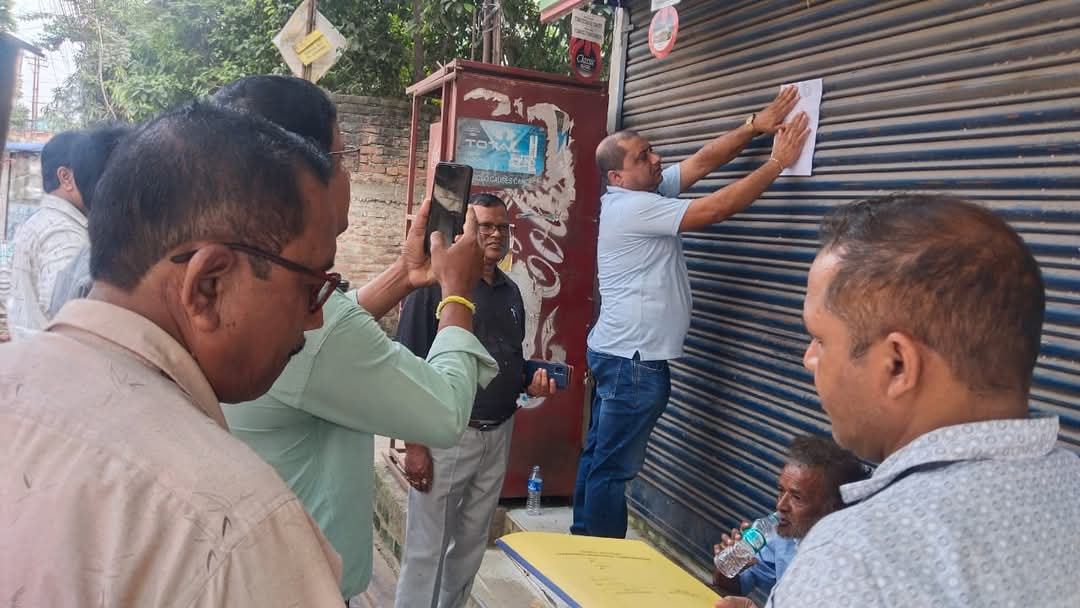Are eateries in Guwahati frequently inspected, or do they operate unchecked after penalties?
Over the past few months, several food joints across Guwahati have faced crackdowns by the Guwahati Municipal Corporation (GMC). From sealing establishments to levying penalties, the GMC claims to act in public interest, citing violations of hygiene and food safety standards. However, the situation is more nuanced, with allegations of inconsistent inspections and financial settlements emerging.
ALSO READ: NHAI Struggles To Acquire Land For Guwahati Ring Road Project
Talking to GPlus, A food joint in Chandmari, seeking anonymity, said, "We are often penalised without a proper explanation. They show up, impose fines, and leave. Once the money is paid, there’s no follow-up inspection. It feels arbitrary, and we don’t even know what standards we’ve violated. After paying the fine, we are allowed to reopen as if nothing happened."
In another instance, an owner in Rehabari, who added, "The fines seem like a routine rather than a genuine attempt to enforce hygiene. There’s no clarity on what we need to improve. If they were serious about hygiene, why don’t they follow up?"
A senior GMC official, speaking to GPlus, denied these claims, asserting that inspections are conducted as needed. He said, "There is no fixed schedule for inspections. However, when violations are identified, food joints are sealed, and they must rectify the issues. They can only reopen after submitting an undertaking and securing permission from GMC."
The official added that some food joints remain sealed due to non-compliance with the Food Safety and Standards Act, 2006 (FSS Act), and other related regulations. "These establishments are given clear instructions to rectify their violations. If they fail to do so, their operations remain suspended.
Only after the court allows can they resume business," the official clarified. Food safety in Assam is regulated under the Food Safety and Standards Act, 2006 (FSS Act) and overseen by the Commissionerate of Food & Drugs Administration (CFDA). These laws aim to ensure public health by regulating food manufacturing, storage, and sale practices.
Key aspects include:
• FSS Act: Establishes the Food Safety and Standards Authority of India (FSSAI) to set benchmarks for food quality, hygiene, and safety.
• CFDA: Operates through two wings:
• Enforcement Wing: Conducts inspections and penalises violators.
• Laboratory Wing: Analyses food samples to ensure compliance.
Violations under the FSS Act can result in severe penalties, including fines, suspension of operations, and even imprisonment for serious offenses like food adulteration.

Penalties Under The FSS Act
Some common violations and their penalties include:
• Selling food of sub-standard quality.
• Selling misbranded or adulterated food.
• Operating under unhygienic conditions.
• Failing to comply with directions from Food Safety Officers.
The FSSAI has proposed stricter penalties, including life imprisonment or a fine of Rs 10 lakh for food adulteration cases.
A Widening Trust Gap
While the GMC and CFDA claim to uphold public health standards, food business operators argue that the process lacks transparency and consistency. Owners say the penalties often feel arbitrary and don’t result in tangible improvements in food safety.
For instance, another food joint owner in GS Road talking to GPlus said, "We are willing to comply with the rules, but there’s no clear communication. Sometimes, we are fined for reasons that don’t make sense. The process feels more like harassment than a genuine attempt to maintain hygiene."
This lack of trust has widened the gap between regulators and food businesses. The citizens, too, have expressed mixed opinions. While many applaud the GMC’s efforts to crack down on unhygienic practices, others question the long-term impact.
A resident in Paltan Bazar talking to GPlus said, "It is good that the authorities are acting, but we still see some of the same unhygienic joints operating after a few weeks. Are these fines making any difference?"
The issue of food hygiene in Guwahati is a shared responsibility between regulators, business operators, and the public. While the GMC’s actions underline the importance of maintaining safety standards, allegations of inconsistency and arbitrariness highlight the need for reforms.
As the city grows and its food industry expands, ensuring that food joints operate under strict hygiene standards is not just a legal requirement but a moral obligation to safeguard public health. For this, a collaborative and transparent approach is essential.
But with repeated allegations of arbitrary penalties and lack of follow-up inspections, are the authorities truly prioritising public health, or is this just a stop-gap measure? Can food businesses and regulators find common ground to ensure both compliance and fairness? Most importantly, how safe is the food we are consuming every day?



